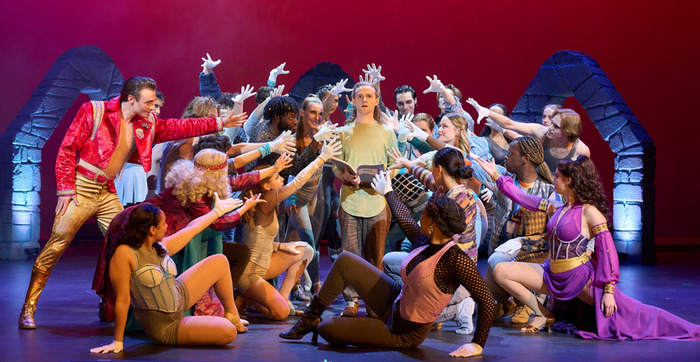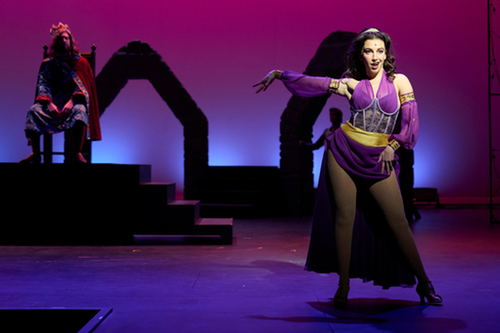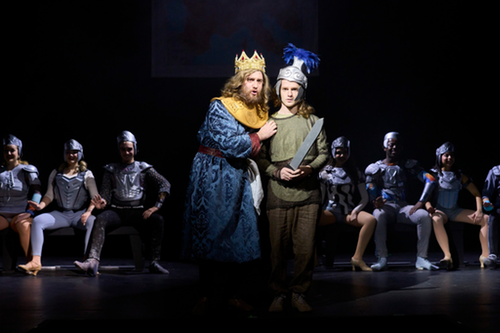
In fall 1971, while chaperoning a group of college students to New York, I saw Pippin, the Stephen Schwartz (music and lyrics), Roger Hirson (book) and Bob Fosse (director/choreographer) musical. I had an instant love affair with the show. Pippin contains one of my most admired musical theater songs “Corner of the Sky,” Pippin’s “I want” song, which not only tells us about the character, but reveals the major meaning for the script.
The original production starred Jonathan Rubinstein as Pippin, while the Leading Player was portrayed by Ben Vereen. Irene Ryan of Beverly Hillbillies fame played Berthe. A 2013 revival featured BW grad Sierra Renee as the leading player.
Originally conceived by Schwartz when he was a student, it was performed by Carnegie Mellon University’s Scotch’n’Soda theatre troupe. Ironically, as the script evolved, Schwartz has said that “not a single line or musical note from that Pippin made it into the final version.” An example of the evolution of the script is the “Theo ending,” used in the BW show. It was not conceived until 1998, when Mitch Sebastian collaborated with Schwartz in an alternative concept for the show. The new ending was included in the 2013 Broadway revival and it altered the meaning of the original show.
The original Broadway production was performed in one act. The BW interpretation is performed in two acts, which, in my opinion, breaks the flow of the show. The magic aspect of the show is so important that in its most recent Broadway revival, it was done as a Cirque de Soleil-like production. Why director Nathan Henry decided to eliminate all of the magic tricks and effects is a mystery. Without them, much of significance and creativity of the show is eliminated. He seemed to somewhat lack how to artistically develop the show to accomplish the intent and purpose of the writers.

Talking about questionable choices, the BW students have wonderful singing voices, but the vocal sounds are only part of the role development. Most important, especially with Stephen Schwartz songs, is the meaning of the words. Musical director Chase Kessler seemed to forget that. In several numbers, notably “Corner of the Sky” words rather than meaning were sung.
On the other hand, Greg Daniels’ reinterpretation of Bob Fosse’s choreography was superlative. Yes, the famous “jazz hands” were present, but there was an expansion of the original dance moves which was effective and wonderful.
For added educational experiences, the university’s musicals are often double cast. (I saw the “Glory Cast,” so my comments only center on that group of actors.)
Kris Lyons was superlative as the Leading Player. She played the lines with meaning and style, working the audience well. This young lady is Broadway-ready.
Julia Martin as Fastrada was wonderful. She milked the laughs showing a complete understanding of comedy, exaggeration and character development.
Jack Borenstein (Charlemagne) started each of his speeches and singing lines with emphasis and then faded into unintelligible endings. He played for laughs for the sake of farcical reaction, sometimes ignoring that the spoken and sung lines had meaning.
Reese Henrick appropriately had fun as Pippin’s grandmother Berthe, though she would have been helped if the traditional method of letting the audience see the words that she invited us to sing had been projected onto a screen or printed in the program.
Jack Prisco had some fine moments as Pippin. He has a nice singing voice. Zach Mackiewicz was character-correct and physically right as Lewis, Pippin’s dense half-brother. Camille Brooks made a charming Catherine, Pippin’s love interest. The singing and dancing ensemble were excellent.

Capsule judgment: When someone goes to a musical theater production at Baldwin Wallace, they probably go with the knowledge that program is ranked as one of the best of its type in the country and the performers are of high quality. They should also be aware that these are students who are not only performing in a show, but are getting a learning experience. The unevenness of the recently closed production of Pippin was not due to the talent of the students, but the decisions of the guest director and a student musical director. As is, the show was enjoyable, but not of the usual high BW level of achievement.
[Full disclosure: Pippin is one of my favorite musicals. I’ve directed it and seen at least twenty different companies produce the show, including a previous staging at Baldwin Wallace. “Corner of the Sky” is my favorite musical theater song.]